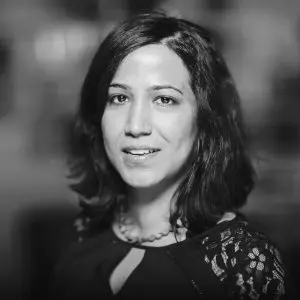The dark basement of a church food pantry in Flushing, New York, is where I decided I needed to learn how to code.
As a social worker when I was 26, I met with and counseled countless undocumented immigrant women–mothers, grandmothers, and young girls. Most of them were looking for food and work, so they could provide for their families. Others were victims of domestic violence, looking to earn money so they could leave abusive relationships.

I learned to code around the time of Arab Spring, a now bygone era of incredible hope and excitement related to technology’s transformative potential. I spent time in Latin America and East Asia studying other emerging movements, absorbing the optimism and empowerment being enabled by digital technologies.
By then, my experience working as a therapist, social worker, immigrant rights advocate, and social movement researcher had made me deeply skeptical of Mark Zuckerberg’s “move fast and break things” ethos, which has defined Silicon Valley. While this mantra is credited with ushering in an era of incredible innovation–the products, platforms, and tools developed by “tech giants”–I saw how it reinforced the ways our social, economic, and political systems and institutions can privilege some groups over others, and reproduce bias and inequality.

I saw first-hand how a loophole in Facebook’s API allowed law enforcement to monitor the social media accounts of young men of color I counseled after they were released from detention, and without their knowledge. (After pressure from advocates, Facebook fixed this glaring privacy problem in 2016.) And how the low-income families I was assisting, already dealing with limited broadband access, were plagued by online ads for predatory loans whenever they tried to search for information online. For these youth of color and low-income families, their experience of technology and the internet was already being shaped by their race, gender, and socioeconomic backgrounds.
The first opportunity to apply my technical skills for social empowerment emerged when I worked for a small grassroots network of public interest lawyers. There, we were given a particular challenge: Develop technology tools to help vulnerable communities access and navigate the local justice systems. One of our first assignments was to help victims of domestic violence, mostly immigrant women, find assistance and get an order of protection.
Based on my experience as a social worker, I knew that any technological solution aimed at helping immigrant women victims of domestic violence must consider the local civil justice system, and the formal and informal social safety net provided by NGOs and other organizations. Our solution: Build a confidential, emergency SMS system, in both English and Spanish, that could connect these women with resources, information, and assistance. We piloted this tool in Spanish-speaking communities in New York City and saw it lead to an increase in the number of orders of protection filed in those jurisdictions.

More recently, this curiosity and desire to build connection brought me to work with computer scientists to develop technical solutions to algorithmic discrimination. As computer scientists were trying to figure out how to codify concepts of “fairness” in algorithmic decision-making tools, we knew we needed to seek the expertise of racial justice advocates, criminal justice reformers, and the civil and human rights communities to define specific fairness criteria based on real-life cases and issues.
Today, my work as a political scientist and technologist at the Ford Foundation focuses on connecting civil society, academia, the private sector, and local and national governments interested in mitigating the harmful effects of emerging technologies. I aim to bring together people who want to stop technology from causing harm, and harness its power for good. Public interest technologists are building bridges across issues, sectors, disciplines, and communities. That matters, because today we not only need to be talking about how technology is developed and used, but also about its broader socioeconomic and political impacts.
We are at the cusp of a new wave of technological thinking, one defined by a new mantra that is the opposite of Zuckerberg’s: “Move carefully and purposely, and embrace complexity.” As part of this wave, a new, inclusive, and intersectional generation of people are using technology for the public interest. This new wave will help us prepare for a future where technical expertise coexists with empathy, humility, and perseverance.
And so, my advice for people working in tech, who are looking for jobs with startups and high-profile Silicon Valley companies: There is no better way to prepare for the future than by working to address some of society’s’ most urgent, complex problems. Consider starting your career by working directly with the people and communities who need your–and technology’s–help the most.
Wilneida Negrón is a techno-political scientist and a Technology Fellow at the Ford Foundation, working on the frontlines of social change to foster cross-disciplinary approaches and solutions in our increasingly complex world with technology.
Recognize your brand’s excellence by applying to this year’s Brands That Matter Awards before the early-rate deadline, May 3.
